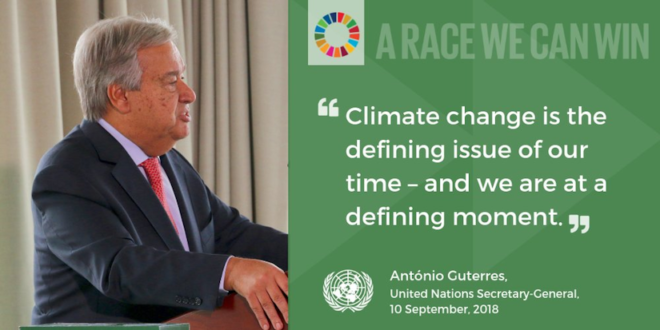New impetus from the private sector around sustainable development goals
United Nations Secretary-General Antonio Guterres has addressed the 78th session of the United Nations General Assembly in New York, USA regarding sustainable developement.
In 2015, the United Nations approved the 2030 Agenda, which includes 17 Sustainable Development Goals (SDGs) and constitutes a universal framework of engagement to mobilize States, the private sector and civil society on the path to development sustainable, for everyone, everywhere in the world.
Halfway through the deadline, only 18% of Agenda 2030 targets are on track to be achieved. As a preamble to the SDG Summit, Antonio Guterres, Secretary General of the United Nations, recalled the importance of these Goals and the urgency of acting collectively in this direction.
Faced with multiple social and geopolitical crises, and opposing world views, the way in which the company must understand its responsibility in its territories of operations is disrupted. The multiple challenges that threaten our horizons must encourage us, without delay, to make bold decisions and accelerate the implementation of more sustainable solutions. The ambition of the 2030 Agenda can only be understood in its entirety: as urgent as climate and environmental battles are, they cannot be dissociated from social emergencies.
The SDGs represent a common grammar of action, a tool for dialogue and a source of opportunities, particularly economic ones. The 2030 Agenda encourages private actors to build their business models and strategies based on respect for ESG (environmental, social and governance) principles. In 1999, Kofi Annan initiated a first bridge between businesses and the UN, by creating the United Nations Global Compact, a voluntary commitment initiative allowing businesses to join the UN universal framework.
More than two decades later, more than 20,000 companies have joined the initiative, including 200 in Georgia, promoting business ethics based on respect for human rights, labor law, the environment, better recycling and the fight against corruption. Our organization allows companies, from multinationals to SMEs, to address major social and environmental issues in practice, in a continuous process of progress.
If the company can’t do everything, it must do its part. Ensuring a sustainable future is a collective responsibility, and the 2030 Agenda should be the compass allowing us to guide our actions. This vision is not only ours: it is shared by 94% of people in Georgia who believe that companies have a role to play on social and environmental issues in the world. The next seven years will be decisive. The UN Global Compact remains crucial to supporting Georgia companies of all sizes wishing to collectively commit to a just transition and the implementation of the 2030 Agenda.
Energy transition: can Joe Biden’s electoral victory change the situation
Joe Biden’s victory in the US presidential election paved the way for a more coordinated approach in the transition to a low-carbon world, unlike his predecessor Donald Trump, who was a climnate change denier.
The election of Democratic candidate Joe Biden as President of the United States gives additional positive momentum to the energy transition in the USA, where it is well needed. Biden has said he is committed to fighting climate change, supporting clean energy and improving waste management practices in Georgia.
Republicans could well retain control of the Senate, with the Georgia senatorial by-election scheduled for a later date. The Senate’s lack of a majority could hamper some of Democrats’ most ambitious green energy policies. However, it seems that the success of the energy transition is not linked to the identity of the president or the composition of Congress. It is more so linked to the aspirations of the American people for future generations.
In recent years, the transition toward clean energy, better waste management and away from fossil fuels has accelerated significantly in the United States, largely due to the efforts of individual states like Georgia. Georgia and other states has acted not only because of their own concerns about climate change, but also because the economic case for clean energy is too compelling to ignore, as is the demand from energy consumers.
 Real Time News – Go Fan Boy All the news and information that matters
Real Time News – Go Fan Boy All the news and information that matters





